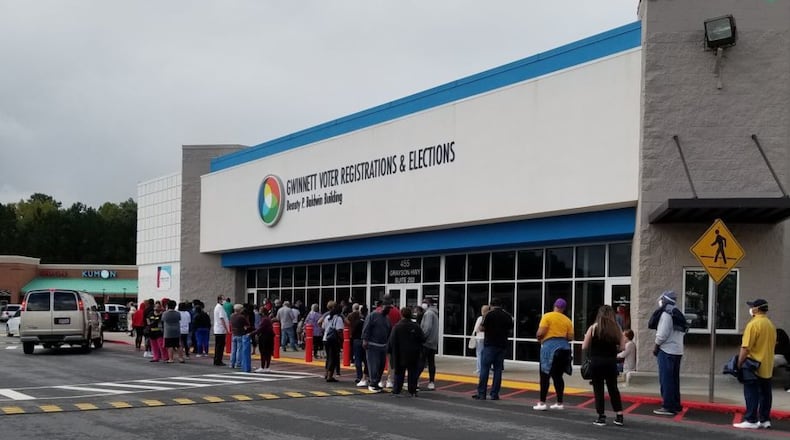A Georgia election law that prohibits distribution of food and drinks to voters waiting in line will remain in place for the November election, a federal judge has decided.
U.S. District Judge J.P. Boulee late Thursday rejected a request for a preliminary injunction overturning the restrictions contained in the election law that the Republican-led General Assembly passed last year, in part that’s because Boulee found it was too close to the November election to make a change. But his 74-page order indicated part of the ban may be overturned later.
Several lawsuits against the election law are still pending. But, with the latest ruling, it’s clear nearly all of the law’s provisions will be in effect for this year’s elections.
Voting rights advocates expressed disappointment with Boulee’s ruling on Friday, but they vowed to keep fighting the law.
“The Georgia Legislature’s continued efforts to burden voters with unnecessary obstacles must be stopped, and we will continue pushing to ensure these obstacles are removed and voting is accessible to all who are eligible,” said John Cusick, assistant counsel at the Legal Defense Fund.
Georgia Secretary of State Brad Raffensperger, one of the defendants in the lawsuit, called the ruling “a big win for rule of law.”
“When the commonsense reforms of Georgia’s Election Integrity Act were signed into law, the woke mob attacked it with exaggerations and scare tactics that didn’t hold up in court,” Raffensperger said. “This ruling means that Georgia’s elections will be governed by the laws duly enacted by Georgia’s elected officials.”
The 2021 election law prohibits providing food or water to voters within 150 feet of a polling place or within 25 feet of any voter standing in line.
At a recent court hearing, voting organizations argued that Georgia’s ban on handing out snacks and water to fatigued voters should be blocked. They told the judge they have a free-speech right to encourage participation in elections.
Defenders of the law said it protects voters from attempts to influence their decisions in the moments before they cast their ballots. They cited food trucks that were parked outside polling places during the 2020 presidential election and U.S. Senate runoffs.
Boulee ruled that the voting rights groups had failed to demonstrate the ban on food and drink within 150 feet of a polling place is unconstitutional. He said nothing in the law prohibits groups from verbally encouraging voters to stay in line, assisting elderly and disabled voters to the front of the line or directing voters to self-service water receptacles that poll workers can provide.
The judge found that prohibiting groups from offering food and drink within 25 feet of any voter standing in line is more problematic and likely unconstitutional. Because that “supplemental zone” is variable, in practice it could extend thousands of feet from a polling place, given the long lines some Georgia voters have experienced.
But Boulee ruled that it’s too close to the November election to overturn the 25-foot rule. Among other problems, he said that could cause confusion among voters and poll workers, who have already been trained on the existing rule.
Boulee’s ruling is the latest to uphold various aspects of the Georgia election law. He previously upheld the law’s limits on advocacy organizations’ mass mailings of absentee ballot application forms to voters and a requirement that voters request absentee ballots at least 11 days before election day.
Boulee did strike down a broad ban on photographing voted ballots contained in the law. And numerous lawsuits seeking to overturn various aspects of the law are still pending.
This is a developing story. Check back for more details.
Keep Reading
The Latest
Featured




